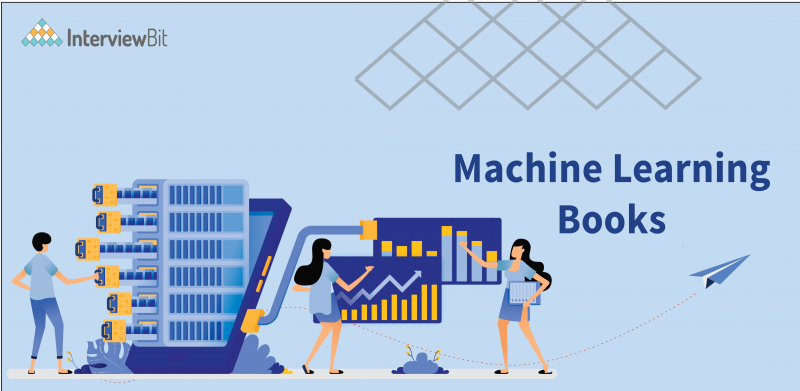- Machine Learning Methods
- Who’s Using ML and What is it Used for?
- Best Machine Learning Books
- 1. Hands-on ML with Scikit-Learn, Keras & TensorFlow
- 2. Mathematics for Machine Learning
- 3. Python Machine Learning By Example
- 4. Introduction to Machine Learning with Python
- 5. The Hundred-Page Machine Learning Book
- 6. Machine Learning For Absolute Beginners
- 7. Python for Data Analysis
- 8. Deep Learning (Adaptive Computation and ML Series)
- Conclusion
- FAQs
- Q.1: Can I learn machine learning from a book?
- Q.2: Which is the best book for machine learning beginners?
- Additional Resources
Machine learning (ML) is a kind of AI (artificial intelligence) that lets software applications become more precise at anticipating results without being specifically programmed to do so. Machine learning algorithms utilize historical data as input to anticipate/predict the latest output values.
Recommendation engines are a standard use case for ML. Other prevalent uses are malware threat detection, spam filtering, fraud detection, predictive maintenance, anomaly detection, and business process automation (BPA).
Machine learning is very essential for companies as it provides a view of trends in customer behavior and business operational patterns, at the same time, backs the latest products’ development. Multiple leading organizations of today, like Uber, Google, and Facebook make machine learning an integral part of their operations. Machine learning has evolved to be an important competitive differentiator for many companies.
Confused about your next job?
Machine Learning Methods
- Supervised machine learning algorithms: These algorithms can apply what has been comprehended in the past to new data with the help of labeled examples to anticipate future events. Beginning from the study of a known training dataset, the learning algorithm delivers an implied function to predict the output values. The system can deliver targets for any new input after adequate training. The learning algorithm can also compare its output with the accurate, calculated output and look for flaws to adjust the model accordingly.
- Unsupervised machine learning algorithms: Theseare utilized when the data used to train is neither categorized nor marked. Unsupervised learning analyses how functions are inferred in a system to define a hidden structure from unlabeled data. The system doesn’t measure the right output, but it analyzes the data and can deduce assumptions from datasets to define hidden structures from data that are unlabelled.
- Semi-supervised machine learning algorithms: These algorithms are categorized in between supervised and unsupervised learning as they both make use of a small quantity of labeled data and a big amount of unlabeled data for the purpose of training. The systems that employ this method can subsequently enhance learning accuracy. Ideally, one chooses semi-supervised learning when the obtained labeled data needs skilled and appropriate resources to train it or learn from it. Otherwise, obtaining unlabeled data typically doesn’t need added resources.
- Reinforcement machine learning algorithms: These algorithms are a learning method that interacts with its environment by delivering actions and finding errors or rewards. The most pertinent aspects of reinforcement learning are Trial and error search and deferred reward. This method lets machines and software agents pick the ideal behavior within a specific context automatically to enhance its performance. Simple reward feedback is needed for the agent to comprehend the most suitable action, this is regarded as the reinforcement signal.
Who’s Using ML and What is it Used for?
Machine learning is employed in a broad range of applications, today. Possibly, the recommendation engine that powers the news feed of Facebook is one of the most well-regarded examples of ML in action.
Facebook makes use of machine learning to customize how every user’s feed is delivered. If a user repeatedly goes through a certain group’s posts, the recommendation engine will begin to exhibit more of that group’s activity in the feed. In actuality, the engine is trying to implement known patterns in the user’s online behavior. If the user changes patterns and doesn’t read posts from that group, their news feed will modify accordingly.
Additionally, apart from recommendation engines, other benefits for ML include the following:
- Customer relationship management. The CRM software can make use of ML models to study emails and helps the sales team members to prioritize the most crucial messages first and reply to them accordingly. More state-of-the-art systems can even suggest potentially compelling responses.
- Business intelligence. Business Intelligence and analytics vendors utilize ML in their software to recognize potentially crucial data points, anomalies, and patterns of data points.
- Human resource information systems. These systems can make use of ML models to filter through apps and specify the most suitable candidates for an open role.
- Self-driving cars. With the help of ML algorithms, it becomes plausible for a semi-autonomous car to identify a partly visible object and warn the driver.
- Virtual assistants. To decipher natural speech and supply context, smart assistants generally integrate both unsupervised and supervised ML models.
Best Machine Learning Books
If you are a novice or experienced in this field, we have gathered the best machine learning textbooks that will work for both beginners and amateurs who are looking to enhance their understanding of machine learning.
1. Hands-on ML with Scikit-Learn, Keras & TensorFlow
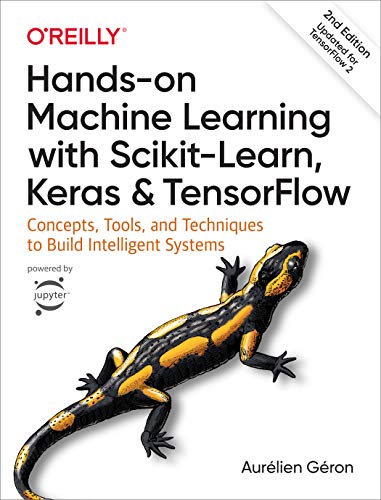
- Author – Aurélien Géron
- Edition – Second Edition
- Publisher – O’Reilly Media, Inc.
This is the best and one of the most popular machine learning books as it offers the best practical introduction to machine learning and focuses on enforcing ML programs with the help of the library Scikit-Learn, Keras & TensorFlow2.
A few new topics have been incorporated in this second edition book, which was not covered in the first edition book. Well, this book presumes that you know close to nothing about ML. By utilizing substantial instances, minimal theory, and two production-ready Python frameworks namely Scikit-Learn and TensorFlow. Author Aurélien Géron enables you to have an intuitive insight into the notions and tools for creating smart systems. You’ll discover a myriad of techniques, ranging from easy linear regression and progressing to comprehensive neural networks. Solving exercises in every chapter will help you apply what you’ve understood, all you require is programming experience to get started.
Important Topics Covered:
This book is considered perfect for you as it combines theories with practice and tons of tremendous project examples. With these things, there are also many excellent topics that will keep you hooked to this book.
- Biological Neurons
- Supervised and Unsupervised Learning Techniques
- Neural Network and Deep Learning
- Deep CV using CNN
- Algorithm Fundamentals
- End-To-End Projects
2. Mathematics for Machine Learning
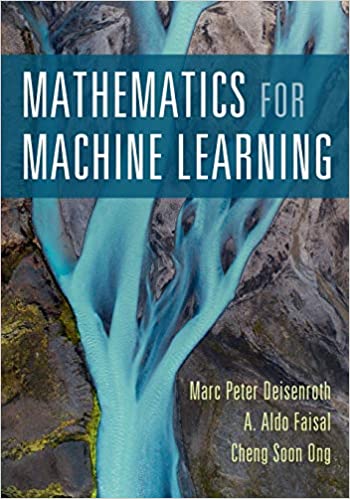
- Author – Marc Peter Deisenroth
- Edition – First Edition
- Publisher – Cambridge University Press
If you have started learning machine learning, then it must have occurred to you how essential mathematics is in machine learning. There are a few books that beautifully define the ideas of machine learning but don’t concentrate much on the mathematics behind that ML concepts, this is when Mathematics for Machine Learning comes to the rescue. The intent of this book is not only to talk about advanced machine learning techniques but to deliver essential mathematical skills. So, every beginner will grasp the concept easily. It will be one of the machine learning best books for you if you are looking to explore the mathematics of machine learning.
Important Topics Covered:
This book will introduce you to two main fundamentals, i.e.
1.) Mathematical Foundation
2.) Instance of ML algorithms that make use of mathematical foundations.
- All Mathematical Topics with Exercises
- Continuous Optimization
- Linear Regression
3. Python Machine Learning By Example
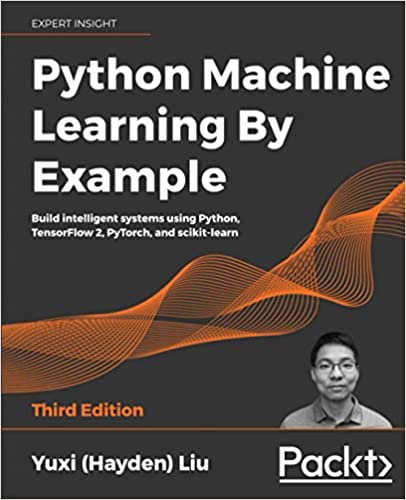
- Author – Yuxi (Hayden) Liu
- Edition – Third Edition
- Publisher – Packt Publishing
This book will take your machine learning knowledge a notch higher. It begins with an intro to ML and the Python language and guides you on how to finish the setup. Further, into the book, you will discover all the essential notions including data preprocessing, exploratory data analysis, feature extraction, data visualization, and clustering, categorization, regression, and model performance evaluation. It contains various projects and you will find it quite fascinating to develop the mechanics of essential machine learning algorithms. Also, you will be directed step by step to create your own models from scratch. At the end of the book, you will garner a comprehensive picture of the machine learning ecosystem and the best approaches to using machine learning techniques. With the help of this book, you will comprehend how to handle data-driven problems and incorporate your solutions with Python, a decisive and simple language. The book is packed with engaging and easy-to-understand examples, like spam email detection, news topic categorization, online ad click-through prediction, these will keep you engaged till you have reached your goal. But before jumping into this book, you should get familiarized with the fundamentals of statistical concepts. Along with the concepts, there are plenty of projects for you to practice.
Important Topics Covered:
The book contains excellent topics, but before that, if you are truly driven towards machine learning and wish to begin working on machine learning assignments, this book is the right pick for you.
- Creating a Movie Recommendation Engine with the help of Naive Bayes
- Identifying Faces with Support Vector Machine
- Anticipating Stock Prices with the help of Artificial Neural Networks
- Taking Decisions in Complex Environments aided by Reinforcement Learning
4. Introduction to Machine Learning with Python
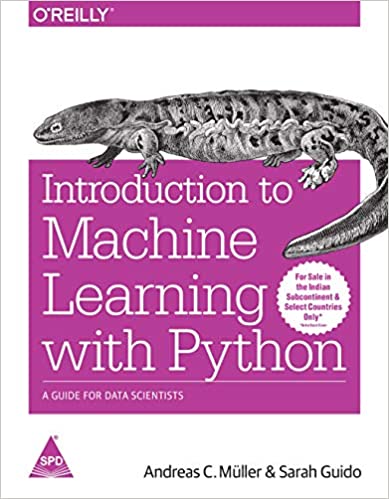
- Author – Andreas C. Müller, Sarah Guido
- Edition – First Edition
- Publisher – O’Reilly Media, Inc.
If you have just started learning machine learning, this book will enable you to create successful machine learning applications with python and the scikit-learn library. If you aspire to be a data scientist by profession, then this book will be your perfect book to commence your machine learning journey. You will get to learn all those basic concepts and applications that will enable you to upgrade your understanding and experience in machine learning as it covers all the topics in a simpler way.
Important Topics Covered:
Before getting started with this book, you should be acquainted with NumPy and Matplotlib library as it will assist you to learn even better. These are common Python libraries helping in common operations and graph plotting.
- Basic concepts and uses of machine learning
- Benefits and drawbacks of commonly used machine learning algorithms
- How to portray data processed by machine learning, that includes which data aspects to concentrate on
- State-of-the-art methods for model evaluation and parameter tuning
- The idea of pipelines for chaining models and summarizing your workflow
- Methods for working with text data, which includes text-specific processing methods
- Recommendations for enhancing your machine learning and data science skills.
5. The Hundred-Page Machine Learning Book
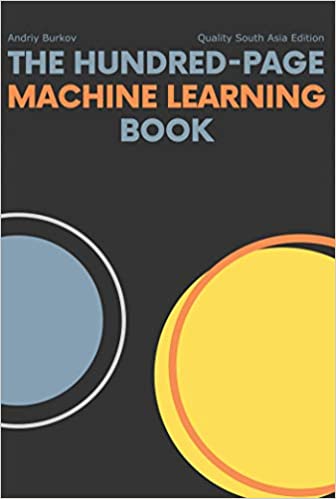
- Author – Andriy Burkov
- Edition – First Edition
- Publisher – Andriy Burkov
The most significant aspect of this book is that it will elucidate machine learning concepts very well and that too within 100+ pages. Having a slight understanding of probability, statistics and math would be useful for you but this book has been documented in a way that you’ll understand most of these once you start reading. It was written by a specialist in machine learning having a Ph.D. in AI with nearly two decades of industry experience in the field of computer science and hands-on machine learning.
This is a remarkable book in many aspects. It is the first successful endeavour to pen an easy-to-read book on ML that hasn’t refrained from using math. It also has packed in a broad range of machine learning topics in an organized way, without risking quality. The book includes only those parts of the huge body of material on machine learning designed since the 1960s that have been ascertained to be of significant practical value. For a novice in machine learning, this book just has sufficient details to help you get a comfortable level of knowledge of this field. Amateurs will use this book as a compilation of pointers as a step towards further self-improvement. When you are brainstorming at the start of a project, this book comes in handy, it gives you the answer to your question of whether a particular technical problem is “machine-learnable” and, if yes, which techniques you should be implemented to solve it. It also comes with a wiki which includes pages that extend some book chapters with added pieces of information including Q&A, code snippets, tools, and relevant resources.
Many editors have analyzed this book and spoken highly about it, it will describe to you all the complicated topics even in a simple way.
After reading this book, you will be able to design such machine learning projects and yes, it will also help you prepare for an ML-based interview.
Important Topics Covered:
- Fundamental Algorithms
- Deep Learning and Neural Networks
- Advanced Practice
- Anatomy of a Learning Algorithm
- Unsupervised Learning
6. Machine Learning For Absolute Beginners
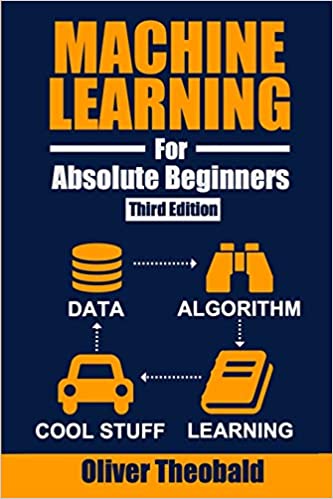
- Author – Oliver Theobald
- Edition – Third Edition
- Publisher – Independently published
This book will be very helpful for novices to learn in-depth about the concepts of machine learning. To make it more understandable, this book gives exact explanations and pictorial instances of Machine Learning concepts and core algorithms. But this book is not the right pick for experienced professionals, it is documented for readers taking their first steps in machine learning.
Important Topics Covered:
- Machine Learning libraries and tool
- Regression analysis
- Decision Trees
- Bias/Variance
- Machine Learning models
- k-Means Clustering to seek new relationships
7. Python for Data Analysis
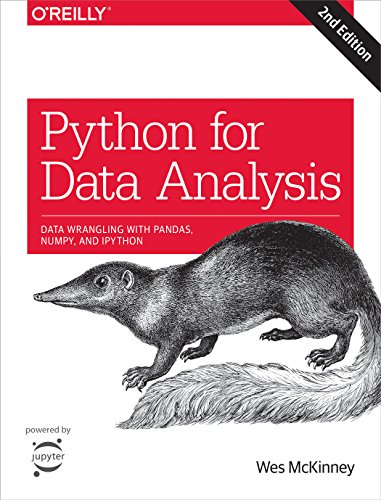
- Author – Wes McKinney
- Edition – Second Edition
- Publisher – O’Reilly Media, Inc.
The most significant thing you have to accomplish as a machine learning engineer is to study the data that are used in machine learning. With this book, you can get complete guidelines for cleaning, manipulating, processing, crunching datasets in Python. Updated for Python 3.6, the 2nd edition of this book comes with useful case studies that demonstrate how to solve a wide collection of data analysis problems efficiently. You’ll discover the new versions of NumPy, pandas, Jupyter, and IPython in the process. It’s perfect for analysts new to Python and Python developers new to the field of data science and scientific computing. Data files and corresponding material are accessible on GitHub.
Important Topics Covered:
- Essential Python Libraries
- Mathematical and Statistical Methods
- Summarizing and Computing Descriptive Statistics
- Data Cleaning and Preparation
- Advanced Pandas
- Data Analysis Examples
8. Deep Learning (Adaptive Computation and ML Series)
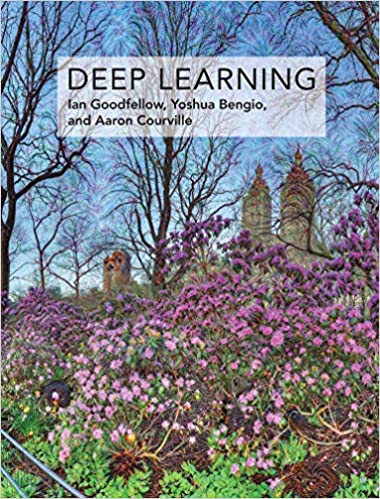
- Author – Yoshua Bengio, Ian Goodfellow, Aaron Courville
- Publisher – The MIT Press
As we all know, deep learning is an upgraded version of machine learning and it allows computers to understand from experience and a ton of data. While working with ML concepts, you will also require to have an appropriate understanding of deep learning concepts. This book will help you a lot as it is regarded as the Bible of Deep Learning. Three experts in the field of deep learning have brought forth a few technical topics, filled with mathematics, and deep generative models in this book.
Important Topics Covered:
- Numerical Computation
- Deep Feedforward Networks
- Optimization for Training Deep Models
- Practical Methodology
- Deep Learning Research
Conclusion
The aforementioned books are the most recommended and best in the realm of machine learning. You can select any of these books as per your topics and field. Any of these ML textbooks should fit your need in building a foundation for your knowledge and understanding of machine learning. These textbooks have already have proved to be the best in the market in this rapidly developing field and should be considered as valuable referential as you move ahead in your machine learning journey. Once you’ve designed your ML algorithm(s), you can start feeding it to datasets and different types of information.
FAQs
Q.1: Can I learn machine learning from a book?
Answer: Yes, you can. There are many beginner-level Machine Learning careers for you to get started with your career.
Q.2: Which is the best book for machine learning beginners?
Answer: Below mentioned is a list of machine learning books best suited for beginners.
- Data Smart: Using Data Science to Transform Information into Insight
- Data Science for Business: What You Need to Know about Data Mining and Data-Analytic Thinking
- Doing Data Science: Straight Talk from the Frontline
- Data Mining: Practical Machine Learning Tools and Techniques







 Join WhatsApp Group
Join WhatsApp Group
